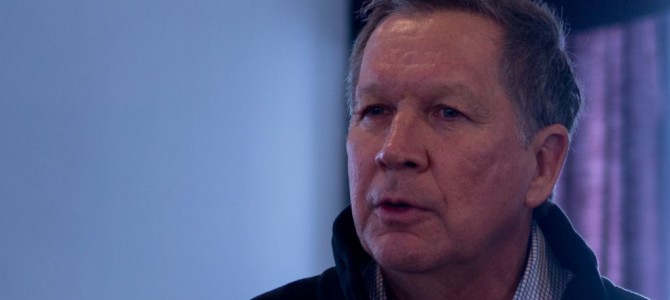Ohio Gov. John Kasich, the last of nine governors to emerge from the 2016 GOP scrum, is an honest-to-goodness reformer, writes Daniel Henninger of The Wall Street Journal. No really, he is. Or was, back in the ‘90s.
This is something we’ve heard from Kasich quite a bit, especially in the debates. “Folks, I’ve done it,” he says repeatedly. “I know how to do this.” He has a point. Kasich was a capable and moderate reformer during an 18-year stint in Congress, and later became a moderate reformer, sort of, as governor of Ohio. In an election cycle when many GOP primary voters have scoffed at political experience, Kasich seems to have hung in there while touting his political experience as his most valuable asset.
But now that he’s one of three candidates left in the Republican primary and seems intent on sticking it out until the convention, his record should come in for more scrutiny. Henninger chronicles early references to Kasich in the Journal’s editorial pages, and reveals that when he became House budget committee chairman in 1995, Kasich cut capital gains taxes! Contained spending! Called for cuts in business subsidies! You know, the kind of things that really get GOP primary voters riled up.
But fair enough. He was a moderate Republican reformer in Congress back in the ‘90s. But as governor of Ohio he’s been something else.
Kasich never tires of telling voters how Ohio had lost 350,000 jobs when he came into office but he reversed it, made the state business-friendly, and so on. What he doesn’t mention is spending growth, which has gone up 35 percent since he entered office. As John Hart of Watchdog.org has reported, Ohio General Revenue spending last year was $4.6 billion more than it was in 2011.
What’s driving all that spending? Medicaid expansion under Obamacare. Enrollment in Ohio has skyrocketed with the expansion of Medicaid, which now accounts for about three-fourths of all Obamacare coverage in the state. Medicaid spending exceeded its cost estimates by $1.5 billion in the first 18 months, blowing a hole in the state budget.
When questioned about it, Kasich is often defiant and has an unfortunate and ridiculous habit of invoking his Christianity to justify expanding a program meant for the frail elderly and the disabled to abled-bodied, working-age adults. “We have to help them, and we’re expected to do that, and I believe the Lord expects us to do that,” Kasich said in 2013. “And it’s spelled out pretty clearly in that Old and New Testament, consistently.”
That’s right. Medicaid expansion is spelled out in the Old and New Testament.
In any other election year, this kind of religious hokum from a GOP candidate would be called out for what it is. But since this year it doesn’t seem to matter what candidates say about policy—Trump said Wednesday that on foreign policy “my primary consultant is myself”—maybe Kasich’s penchant for big spending and Medicaid expansion in Ohio won’t matter to voters.
Maybe nothing will. And maybe that, more than his big government sins, is Kasich’s real problem.









